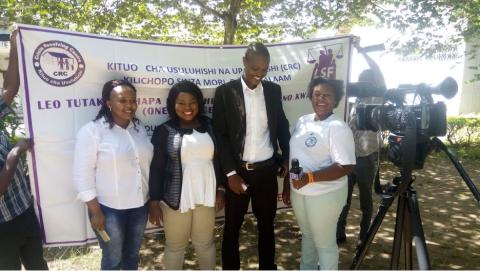Lack of protection a threat to female journalists’ coverage of environment stories in Tanzania
Submitted by fkakooza on

While female journalists are increasingly taking an interest in environment journalism and climate reporting, they remain dogged by challenges that limit their reporting capabilities.
According to African Freedom of Information Center, the Tanzanian media landscape has grown, yet gender disparities persist, with fewer female journalists despite more female graduates. Women hold lower positions and cover "soft news," while men take on the more physical tasks. Female journalists also endure unequal pay and high levels of sexual harassment.
In a study which was produced for Green Blood, a reporting project whose aim is to continue the reporting of local environmental journalists who have been forced to abandon their work due to allegations of a number of women being raped by guards.
Penina Malundo, a female journalist working with Majira Majira Newspaper highlighted the challenges women face while covering environmental stories. She mentioned failure to get interviews for their stories adding that finding an expert on an environment topic is equally a challenge and yet even after getting them there is delayed response.
She added that lack of adequate funds to cover stories hinders her from publishing environmental stories citing lack of transport and lack of money to buy food in the field among others.
She further mentioned lack of additional training on environment reporting among young female journalist in order to impress them to start writing about climate change despite the challenges. “Women can bring a unique perspective on reporting about environment when they are given more light on how to start writing news about climate change” she said.
Malundo shared her experience when she first worked at Mwananchi communication in 2009 but later moved to Majira Majia Newspaper in 2019 after getting training from FORUMCC institution which introduced her to writing about climate change.
In her story, “Mangrove,” she was able to call upon government and people to cooperate in planting new mangrove forests and called on government to implement laws against people carrying out deforestation.
Miriam John, another female journalist says that she could not put up with her editor’s behavior, which involved constant sexual harassment and abuse, making her leave the job she loved.
“It happened one day on my commute to work. He invited me to his home, an invitation I declined. The work environment subsequently became so hostile and unbearable that I had no choice but to resign” she said.
However some organization such as The Tanzania Media Women’s Association in Zanzibar (TAMWA) has called on the government to formulate laws on policies to promote adherence to gender equality in all sectors and create a database for ease of access to information on women leaders.
UNESCO and the International Federation of Journalists, recently noted that environmental journalism has become an increasingly perilous field. The often-remote and isolated nature of the work, and the subject matter reported on – including fossil fuel companies, mining firms, land grabbing and deforestation – contributed to the danger “Without reliable scientific information about the ongoing environmental crisis, we can never hope to overcome it. And yet the journalists we rely on to investigate this subject and ensure information is accessible face unacceptably high risks all over the world,” said Audrey Azoulay, director general of UNESCO on 3 May, the World Press Freedom Day.
- 54 reads
